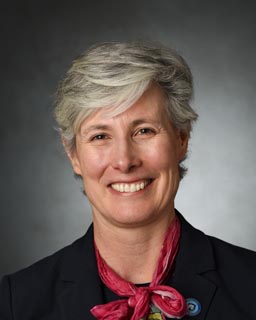Newly elected national aerospace leader reflects on industry trends
4/8/2021
By Mariah Chuprinski
UNIVERSITY PARK, Pa — Amy Pritchett, professor and head of Penn State’s Department of Aerospace Engineering, was recently appointed chair of the Aerospace Department Chairs Association (ADCA) for a two-year term. She held the position of vice chair for the past two years.
“Penn State has had a leadership role in the aerospace community for decades, and we have had a number of past Penn State aerospace department heads serve in this role,” Pritchett said. “I was delighted to be nominated and elected in January to be chair.”
While an independent entity, ADCA is affiliated with the American Institute of Aeronautics and Astronautics and members meet annually at the institute’s SciTech conference.
In leading the association, Pritchett plans to look closely at the role and presence of women and people from underrepresented groups in the aerospace field. One of ADCA’s functions is to regularly collect statistics on higher education enrollment, initiatives and administration.
“There have been increases in overall enrollment in aerospace programs over the last few years,” she said. “But a disturbing trend is that the percentage of women in the field has been fixed at 13% for decades.”
Pritchett herself is one of only two female aerospace engineering department heads in the country.
The aerospace industry is growing, according to Pritchett, with increased demand for aerospace graduates in several industry roles, including space exploration.
“Space is no longer just the purview of the government, but is quickly moving into the commercial sector,” she said. “There are huge, visible discoveries being made every day, like looking at life on Mars and discovering new planets.”
There also are new technologies being implemented in telecommunications, transportation, electrical grids and retail delivery.
“In this time of excitement for the field, why isn’t aerospace engineering viewed as a more attractive profession to huge segments of the population, including women?” she said.
At Penn State, Pritchett conducts research to find out why more people, and particularly women, have not been drawn to major in aerospace engineering in greater numbers. She has found that some female and racially underrepresented students are concerned about fitting in and feeling welcome when joining a major consisting predominantly of white men.
“All our undergraduate students had to pass difficult entrance-to-major criteria to get into the aerospace major,” she said. “The same is true for grad students: We only pick the best students. For that reason, students from different groups deserve to be here and should not be masking who they are to fit in. They should be the full expression of who they are and where they are.”
With the new appointment to ADCA, Pritchett hopes to encourage aerospace leadership to not only admit more women and people from underrepresented groups, but also to prioritize making their learning communities more inclusive and welcoming.
“Departments, including my own at Penn State, should do all they can to promote professionalism, etiquette, courtesy and mutual respect among students and faculty,” Pritchett said.




